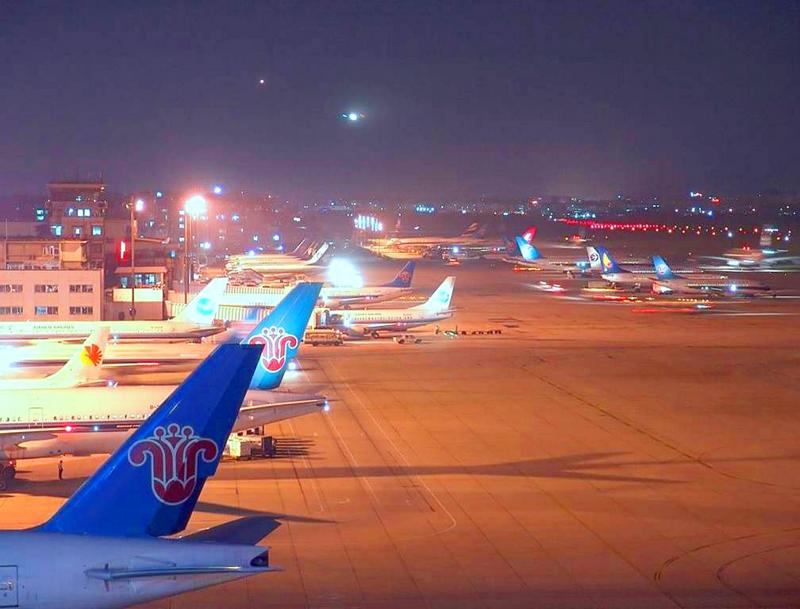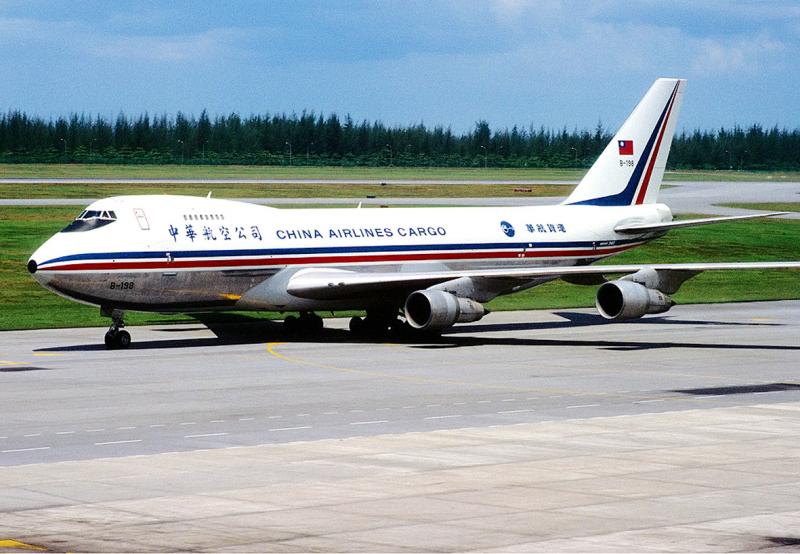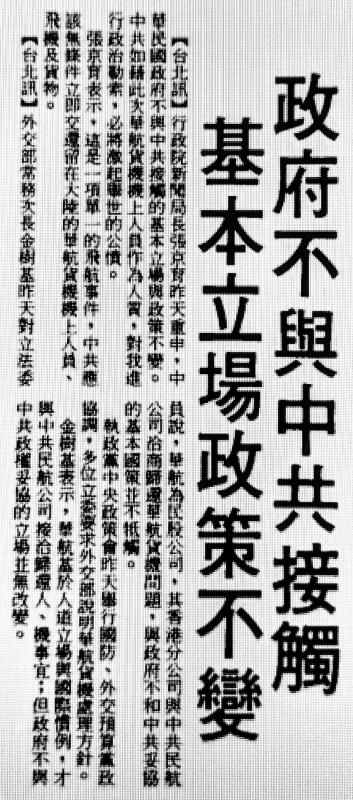May 24 to May 30
The authorities weren’t sure what to make of it when a Taiwanese cargo plane turned up in Guangzhou, China instead of its original destination of Hong Kong on May 3, 1986. They initially believed that Beijing was behind the hijacking, and vowed to rescue the three crew members.
“I can’t think of any reason he would want to go to [China],” pilot Wang Hsi-chueh’s (王錫爵) wife told the United Daily News. (聯合報) “I am 100 percent sure he was forced to go there.” However, as the events unfolded, it was revealed that Wang carefully planned and carried out the hijacking by himself.

Photo courtesy of Wikimedia Commons
Wang, who was born in China and came to Taiwan in 1949 with the Chinese Nationalist Party (KMT), was apparently unhappy with his job with China Airlines, and also wanted to see his father and relatives who he left behind. His wife and children could not believe the news.
The KMT had abided by the Three-Noes Policy (no contact, no negotiation and no compromise) toward the Chinese Communist Party (CCP) up to this point, and it was a tricky question how to get the plane and crew back.
An exception was worked out where China Airlines negotiated directely with its Chinese counterpart. After three tense meetings in Hong Kong, first officer Tung Kuang-hsing (董光興) and flight engineer Chiu Ming-chih (邱明志) arrived home at today’s Taoyuan International Airport on May 23, 1986.

Photo courtesy of Wikimedia Commons
Wang remained in China and was seen as a hero for opening communications between the KMT and CCP. He continued to serve as a pilot in Beijing and provided an update on his life through the United Daily News in 2007. His charges in Taiwan were dropped in 2011 when the statute of limitations expired.
MISSING PLANE?
When the news first broke, the media described it as a case of a missing plane.

Photo courtesy of National Central Library
“A Boeing 747F with the serial number B189 … was scheduled to arrive at Hong Kong yesterday at 3:07pm. It never landed and failed to contact local traffic authorities. There are three crew members aboard and the aircraft is deemed to be missing. We are verifying the reports claiming it has landed in Guangzhou’s Baiyun Airport,” the United Daily News printed.
The next day, Tung’s wife in the US got a call from her husband, who said that he and Chiu are doing well and waiting for the CCP to send them back to Taiwan. Curiously, there was no mention of Wang.
That same day, Beijing authorities announced that Wang had decided to remain in China, which the KMT blasted as united front work, intended to sway Taiwan’s people and challenge its government.
Wang’s wife of 30 years was sure that her husband was being manipulated and used by the CCP, as he showed no unusual signs when he left that day and told her he would be back. Wang lost his mother when he was young, and he hadn’t spoken to his father in China for more than 30 years, so she doubted his motives.
The authorities believed that the CCP somehow forced the plane to land in China, and called for a “rescue mission” to get the crew and plane back.
“We will not change our policy of no contact with the CCP, no matter how unreasonable and difficult they behave,” the newspaper printed.
China Airlines asked the Hong Kong-based Cathay Pacific to serve as an intermediary, but Beijing rejected this offer. It insisted that this was an “internal issue” and China Airlines officials should travel directly to Beijing to talk. Beijing had been calling for direct communication, flights and trade with Taipei, and this was the ideal situation to force the doors open.
ARDUOUS NEGOTIATIONS
On May 6, Wang arrived in Beijing. Still wearing his pilot uniform, he shook hands with his father and three brothers. He still had 35 relatives in China, and the authorities welcomed him to stay.
In a press conference, Wang said that he missed China and blasted Taiwan’s political corruption, calling it a place infested with violent criminals and swindlers. “There are secret police hidden everywhere, and the traffic is horrible,” he added.
He then criticized China Airlines’ management and announced that he had defected entirely on his own will. But his family in Taiwan still believed that he was forced to say these things, citing his lack of expression when he spoke. Rumors flew that the CCP paid him to hijack the plane to force Taiwan to break its Three-Noes Policy.
After a few days of no progress, China Airlines offered to send a delegation to meet with its counterpart, CAAC Airlines, in Hong Kong. Although both airlines were state-owned, they technically weren’t government organizations, so an exception could be made out of humanitarian concerns, the United Daily News reported.
Talks began on May 17. No agreement was reached, as China insisted that the Taiwanese personnel head to Guangzhou to retrieve the plane and crew. They were also adamant on only releasing Chiu and Tung; Taiwanese authorities wanted all three.
On the third day, the Chinese finally agreed to send the crew and plane to Hong Kong. Once Chiu and Tung returned home, they told reporters how Wang forcefully hijacked the plane after a brief struggle.
The authorities were adamant that this incident would have no effect on the calls to allow people in Taiwan to visit their loved ones in China. But they relented the following year, unofficially ending the Three Noes Policy.
Twenty-one years later, the United Daily News caught up with Wang, who was living in Beijing. Wang said he carefully planned the hijacking, requesting to fly the cargo plane a month earlier to avoid affecting passengers. While in the air, he sent Chiu on an errand, then told Tung he wanted to do an anti-hijacking simulation. He handcuffed the unsuspecting Tung to the chair, and when Chiu returned he announced that they were Guangzhou-bound. There was no “struggle,” he insisted.
He never divorced his wife, he said, and the two reunited in China five years later as restrictions relaxed. Two of his children were working in China, and his wife visited a few times per year to travel together — he even showed photos to prove it.
Taiwan in Time, a column about Taiwan’s history that is published every Sunday, spotlights important or interesting events around the nation that either have anniversaries this week or are tied to current events.

Growing up in a rural, religious community in western Canada, Kyle McCarthy loved hockey, but once he came out at 19, he quit, convinced being openly gay and an active player was untenable. So the 32-year-old says he is “very surprised” by the runaway success of Heated Rivalry, a Canadian-made series about the romance between two closeted gay players in a sport that has historically made gay men feel unwelcome. Ben Baby, the 43-year-old commissioner of the Toronto Gay Hockey Association (TGHA), calls the success of the show — which has catapulted its young lead actors to stardom -- “shocking,” and says

The People’s Republic of China (PRC) invaded Vietnam in 1979, following a year of increasingly tense relations between the two states. Beijing viewed Vietnam’s close relations with Soviet Russia as a threat. One of the pretexts it used was the alleged mistreatment of the ethnic Chinese in Vietnam. Tension between the ethnic Chinese and governments in Vietnam had been ongoing for decades. The French used to play off the Vietnamese against the Chinese as a divide-and-rule strategy. The Saigon government in 1956 compelled all Vietnam-born Chinese to adopt Vietnamese citizenship. It also banned them from 11 trades they had previously

Inside an ordinary-looking townhouse on a narrow road in central Kaohsiung, Tsai A-li (蔡阿李) raised her three children alone for 15 years. As far as the children knew, their father was away working in the US. They were kept in the dark for as long as possible by their mother, for the truth was perhaps too sad and unjust for their young minds to bear. The family home of White Terror victim Ko Chi-hua (柯旗化) is now open to the public. Admission is free and it is just a short walk from the Kaohsiung train station. Walk two blocks south along Jhongshan

Snoop Dogg arrived at Intuit Dome hours before tipoff, long before most fans filled the arena and even before some players. Dressed in a gray suit and black turtleneck, a diamond-encrusted Peacock pendant resting on his chest and purple Chuck Taylor sneakers with gold laces nodding to his lifelong Los Angeles Lakers allegiance, Snoop didn’t rush. He didn’t posture. He waited for his moment to shine as an NBA analyst alongside Reggie Miller and Terry Gannon for Peacock’s recent Golden State Warriors at Los Angeles Clippers broadcast during the second half. With an AP reporter trailing him through the arena for an